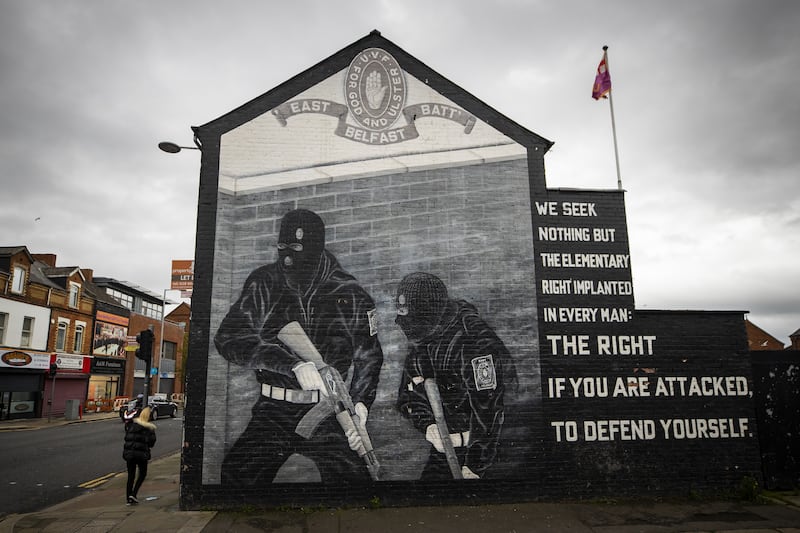Is anyone genuinely surprised that, according to the latest LucidTalk opinion poll, an overwhelming majority of unionists – around 80% – support executive ministers meeting with representatives of the LCC?
I wasn’t surprised. But nor does it mean that 80% of unionists support the loyalist paramilitary groups linked to the LCC, namely the UDA, UVF and RHC.
There is a widespread belief across most of unionism that the Sinn Féin/Army Council relationship remains much the same as the October 2015 assessment of paramilitarism: “PIRA members believe that the PAC (Provisional Army Council) oversees both PIRA and Sinn Féin with an overarching strategy. We judge this strategy has a wholly political focus.”
In other words, the ‘official’ view – which hasn’t been revisited since 2015 – is that the PAC has significant and continuing input into the thinking of Sinn Féin and PIRA (assessed as “committed to the peace process and its aim of achieving a united Ireland by political means”).
The LCC was formed six days before the paramilitary assessment was published on October 19.
I suspect key political/paramilitary players had been given sight or indication of what was being said about loyalist paramilitaries and decided that it needed to be seen to have already kickstarted a major project on the transition process.
What those behind its organisation wanted, or so I presume, was to reach the point the PAC had reached already: a standing down of the ‘troops’ and access to unionists in the executive.

But the relationship between loyalist paramilitarism and the unionist parties is not the same as the relationship between Sinn Féin and the IRA.
That’s because the unionist/loyalist community is broader and more divided: and therefore much more difficult to get on the same page at the same time.
For instance, in 1998 the UUP and three main loyalist paramilitary groups supported the Good Friday Agreement, while the DUP and UKUP opposed it.
Today, loyalists, the TUV (now with more support than the UUP, according to LucidTalk) and a growing section of the DUP’s base have very real difficulty with the assembly and executive.
Another difficulty is that loyalist paramilitarism – parts of it at least – still seem to be ‘on the street’ in a variety of disguises. It is very noisy compared to the sotto voce presence of the PAC.
And it’s that noise which makes it occasionally uncomfortable for party political unionism to deal with.
Yet choosing to ignore it altogether would, almost certainly, make the survival of the assembly much more difficult.

Just look at the contents of Martin McGuinness’s resignation letter in January 2017, when it was clear that the PAC and SF electoral base were pretty fed up with the DUP.
How, I wonder, would nationalists/republicans respond to the LucidTalk question ‘Should Sinn Féin still be involved in an overarching strategy which involves the PAC (bearing in mind that the PAC probably provides regular briefings to its PIRA base)?"
I’d be surprised if the answer weren’t an overwhelming yes: an answer I would fully understand. Nor would I be surprised – and also fully understand – if the overwhelming majority of unionists replied no to the question.
I have huge problems with the LCC, not least its ongoing failure to get paramilitarism off the streets; but I also accept that being seen to abandon loyalism and its concerns (some real, some manufactured and some deployed by those with a separate agenda) could make an inconvenient situation very much worse.
In the same way that Sinn Féin could not survive in the peace process if the PAC backed away from it, unionism would find it very difficult to hold on if the groups represented by the LCC backed away.
Many nationalist readers of this column, maybe even the majority, will find much to discomfit them. They do not like the fact the LCC has ‘influence’ (almost 90% of them thought the LCC shouldn’t be met by executive ministers), but the fact remains that the LCC does have influence.
Personally, I wish that there were no need – or excuse – for the PAC and LCC almost 27 years after the Agreement was endorsed in a referendum. But there it is and there they are.
Loyalism – as has so often been the case since 1921 – feels it has been left behind by events.
There would not have been a Good Friday Agreement without the imprimatur of the UDA, UVF and RHC (it wouldn’t have got across the line without the PAC, either), but for some reason they now believe they have been betrayed.
The LCC believes it has a role to play and should have access to executive ministers. So be it.
But in return for that role and access it really needs to complete the transition process and sign up – unambiguously so – to democracy alone.
I have huge problems with the LCC, not least its ongoing failure to get paramilitarism off the streets, but I also accept that being seen to abandon loyalism and its concerns could make an inconvenient situation very much worse



